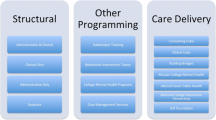Abstract
Purpose of Review
Over the last decade, the number and severity of mental health problems among college students has continued to rise. Universities are struggling to dedicate enough resources to meet the mental health needs of students. In this article, we review on-campus innovative programs designed to promote recovery in high-risk college students.
Recent Findings
Colleges respond in a variety of ways to students on campus with serious mental health problems, from encouraging or requiring students to take a leave of absence, to creating treatment programs and reducing course loads to treat in place. On-campus programs that address the needs of high-risk students can include post-hospitalization programs, intensive outpatient groups, and specialized treatment for diverse populations such as athletes.
Summary
Some universities are developing unique programs that enable high-risk college students to recover on campus. More research is needed to determine how best to deliver this care.
Similar content being viewed by others
References
Papers of particular interest, published recently, have been highlighted as: • Of importance •• Of major importance
•• National Council on Disability. Report: mental health on college campuses: investments, accommodations needed to address student needs. 2017. https://ncd.gov/publications/2017/mental-health-college-campuses-investments-accommodations-needed-address-student. Accessed August 3, 2019. This 128-page report provides important information about the state of college mental health and the need for more services using evidence-based literature as well as surveys and questionnaires.
Schwartz V. Mandatory leave of absence for college students with suicidal behaviors: the real story. Psychiatr Times. 2016;33(8) https://www.psychiatrictimes.com/suicide/mandatory-leave-absence-college-students-suicidal-behaviors-real-story/page/0/1. Accessed August 3, 2018.
• Lipson S, Kern A, Eisenberg D, Noble A. Mental health disparities among college students of color. J Adolesc Health. 2018;63(3):348–56. https://doi.org/10.1016/j.jadohealth.2018.04.014. This report demonstrates an ongoing challenge of students of color in accessing mental health care.
National College Health Assessment Data. American College Health Association. https://www.acha.org/NCHA/ACHA-NCHA_Data/Publications_and_Reports/NCHA/Data/Reports_ACHA-NCHAIIc.aspx. Accessed August 3, 2019.
Research on adolescent and young adult mental health. Healthy Minds Network. http://healthymindsnetwork.org/research/data-for-researchers. Accessed August 3, 2019.
Lipson S, Lattie E, Eisenberg D. Increased rates of mental health service utilization by U.S. college students: 10-year population level trends (2007-2017). Psychiatr Serv. 2018;70(1):60–3. https://doi.org/10.1176/appi.ps.201800332.
Roy N, Braider L. College students and mental illness: strategies for optimal results. Psychiatr Times. 2016;33:5 http://www.psychiatrictimes.com/child-adolescent-psychiatry/college-students-and-mental-illness-strategies-optimal-results. Accessed August 10, 2019.
Suicide statistics. American Foundation for Suicide Prevention. https://afsp.org/about-suicide/suicide-statistics/. Accessed May 5, 2019.
Suicide among college and university students in the United States. Suicide Prevention Resource Center. https://www.sprc.org/sites/default/files/migrate/library/SuicideAmongCollegeStudentsInUS.pdf. Accessed August 10, 2019.
Iarovici D. Perspectives on college student suicide. National Network of Depression Centers. 1995. https://nndc.org/perspectives-on-college-student-suicide/. Accessed August 10, 2019.
National Survey of College Counseling Centers 2014. American College Counseling Association. http://d-scholarship.pitt.edu/28178/1/survey_2014.pdf. Accessed August 10, 2019.
Director survey 2018. Association for University and College Counseling Center Directors. https://www.aucccd.org/director-surveys-public. Accessed August 10, 2019.
Downs N, Alderman T, Schneiber K, Swerdlow N. Treat and teach our students well: college mental health and collaborative campus communities. Psychiatr Serv. 2016;67(9):957–63. https://doi.org/10.1176/appi.ps.201500465.
Downs N, Galles E, Skehan B, Lipson S. Be true to our schools – models of care in college mental health. Curr Psychiatry Rep. 2018;20(9):72. https://doi.org/10.1007/s11920-018-0935-6.
College Mental Health Program. McLean. https://www.mcleanhospital.org/programs/college-mental-health-program. Accessed August 11, 2019.
Hoisington S. Campus fears drive boom in threat-assessment teams. Chron High Educ. 2017; https://www.chronicle.com/article/Campus-Fears-Drive-Boom-in/241499. Accessed August 31, 2019.
• Feldpausch, N. iTEAM – an update on CSU’s innovative approach to post-hospitalization care on campus. American Psychiatric Association Annual Meeting. San Francisco, 2019. Care for the high-risk college student: three innovative programs for crisis intervention, suicide prevention, and post-hospitalization care. The information in this article about iTeam was presented at the 2019 American Psychiatric Association annual meeting.
The Jed Campus. Increasing student retention through improved mental health, 2015. http://www.jedcampus.org/wp-content/uploads/2018/01/HiEd_WP_020717_StudentRetentionWP.pdf. Accessed August 11, 2019.
Cornish PA, Berry G, Benton S, Barros-Gomes P, Johnson D, Ginsburg R, et al. Meeting the mental health needs of today’s college student: reinventing services through stepped care 2.0. Psychol Serv. 2017;14(4):428–42 https://doi.org/10.1037/ser0000158.
Stepped care approach. Center for Innovation in campus mental health. 2019. https://campusmentalhealth.ca/toolkits/campus-community-connection/models-frameworks/stepped-care-model/. Accessed September 4, 2019.
• Eshelman, M. Intensive outpatient offered at a university counseling center. American Psychiatric Association Annual Meeting. San Francisco, 2019. Care for the high-risk college student: three innovative programs for crisis intervention, suicide prevention, and post-hospitalization care. The information in this article about intensive outpatient treatment was presented at the 2019 American Psychiatric Association annual meeting.
Ritschel LA, Cheavens JS, Nelson J. Dialectical behavior therapy in an intensive outpatient program with a mixed-diagnostic sample. J Clin Psychol. 2012;68(3):221–35. First published: 15 March 2012. https://doi.org/10.1002/jclp.20863.
• Gouttebarge V, Castaldelli-Maia JM, Gorczynski P, Hainline B, Hitchcock ME, et al. Occurrence of mental health symptoms and disorders in current and former elite athletes: a systematic review and meta-analysis. Br J Sports Med. 2019;53:700–6. https://doi.org/10.1136/bjsports-2019-100671. This article highlights the stressors that elite athletes can face especially when injured or unable to perform well.
2018–2019 NCAA, Division I manual, Effective August 1, 2018.
Mental health by the numbers. National Alliance on Mental Illness. https://www.nami.org/learn-more/mental-health-by-the-numbers. Accessed August 11, 2019.
Acknowledgments
The editors would like to thank Dr. Victor Hong for taking the time to review this manuscript.
Author information
Authors and Affiliations
Corresponding author
Ethics declarations
Conflict of Interest
Marcia R. Morris, Nora I. Feldpausch, Melissa G. Inga Eshelman, and Bettina U. Bohle-Frankel declare that they have no conflict of interest.
Human and Animal Rights Consent
This article does not contain any studies with human or animal subjects performed by any of the authors.
Additional information
Publisher’s Note
Springer Nature remains neutral with regard to jurisdictional claims in published maps and institutional affiliations.
This article is part of the Topical Collection on Complex Medical-Psychiatric Issues
Rights and permissions
About this article
Cite this article
Morris, M.R., Feldpausch, N.I., Inga Eshelman, M.G. et al. Recovering in Place: Creating Campus Models of Care for the High-Risk College Student. Curr Psychiatry Rep 21, 111 (2019). https://doi.org/10.1007/s11920-019-1101-5
Published:
DOI: https://doi.org/10.1007/s11920-019-1101-5




